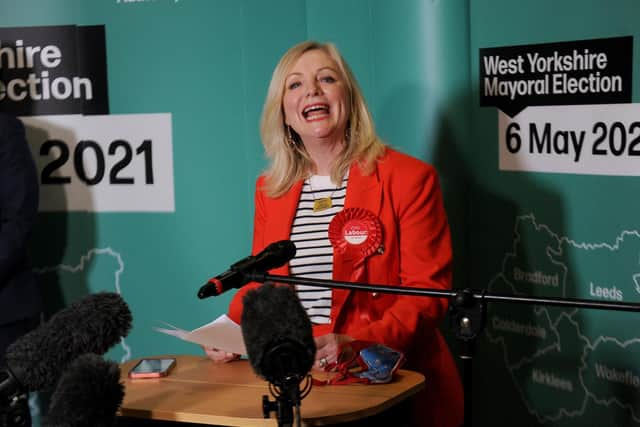West Yorkshire mayor Tracy Brabin wants to make her region a hotbed of creative talent to help its economic recovery
Tracy Brabin who this week defied Labour’s poor election results to be elected mayor of West Yorkshire, said she would be making the case to Ministers for it to carve out an identity as a “creative region” as part of its recovery from Covid-19.
But ahead of the latest easing of restrictions on Monday, which will see theatres, cinemas, galleries and music venues reopen, the former Coronation Street actress warned creative industries were not returning to normal as fast as the rest of society.


Advertisement
Hide AdAdvertisement
Hide AdMs Brabin told The Yorkshire Post that nearly 8,000 people in West Yorkshire’s creative industries were still on furlough and added: “My worry is that after furlough ends, whether we will also then see a rise in unemployment in that sector, as people are laid off.”
Amid reports that a quarter of the 200,000 creative freelancers will not return to the industry after being forced out of work, the General Secretary of performers’ union Equity says there is “terror” among his members about whether industries like theatre and television will return to how they were before the pandemic.
Paul Fleming, a former trade union organiser in Scunthorpe, said: “Producing high quality art is one of the reasons why people want to visit Yorkshire and the UK, it is part of a global standing. All of that is at risk because of the experience of the last 12 months.”
He said a failure to get people back to work at thriving theatres in places like Doncaster and Bradford would have a damaging knock-on effect for the hospitality industry.
Advertisement
Hide AdAdvertisement
Hide AdMs Brabin, a former Labour Shadow Culture Minister who resigned as the Batley and Spen MP after her election last weekend, plans to draw on her creative connections to aid West Yorkshire’s recovery from the pandemic.
Before her election, West Yorkshire leaders included £50m of investment in the region’s creative and cultural industries as part of an economic recovery plan that was not taken up by the Government.
Ms Brabin said: “I think now we have the mayor, there is an opportunity to make the case that this could be our identity as a creative region, and we certainly see brilliant pockets of it. And drawing all these together over the next three years and subsequent four, I’m hoping to make West Yorkshire a real incubator for talent, but also a magnet for international talent.”
She criticised the Government’s £1.57bn Culture Recovery Fund to help the arts bounce back from the pandemic as being too focused on “saving shiny buildings” and not people who work in them.
Advertisement
Hide AdAdvertisement
Hide AdShe said: “Without those freelancers and creators, we’ve got no intellectual property, we’ve got nobody to employ others, we’ve got no Billy Elliot.
"We need those playwrights, those creators, and I want that Yorkshire voice that Yorkshire brand in the way that [Leeds-born Fat Friends writer] Kay Mellor or [production company] True North have done so well, making Yorkshire a great brand around the world, we can go further and I'm really ambitious for the region in that way."
She said talks had already taken place over an idea to create a new film studio in the North and she hoped to repeat the success of the Batley and Spen Youth Theatre Company, which has had great success as a springboard for young people into careers in the arts.
She added: "So my work at the moment is to try and understand where I can get the most financial leverage, whether that's in a portfolio, whether that's a culture committee, practitioners across the region."
Advertisement
Hide AdAdvertisement
Hide AdA Government spokeswoman said: “More than £1.2bn has been allocated from the Culture Recovery Fund, including over £100m to organisations and sites in Yorkshire, to protect thousands of jobs, stabilise organisations of all sizes and help them prepare to reopen. The Events Research Programme is testing ways we can help the arts and creative industries return in front of fuller audiences so that they can bounce back strongly.”